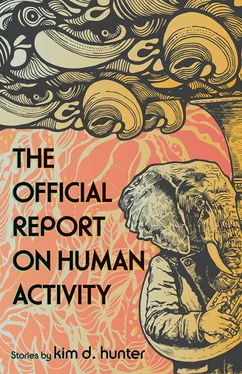One Tuesday (which seemed just as bad as any Monday, though Wednesdays were worse and Thursdays were sad until they became Fridays when he walked, somewhat compensated, out of the factory, headed toward Saturday) he was wrestling with the monkey versus pig, round swine into narrowing orifice conundrums, and noticed a stirring in himself. He seemed slightly heavier than normal and a bowel movement was no relief on that score. Then a shape poked out of his abdomen. It didn’t really hurt but he didn’t like it. It was a dream injury. In the plain light of day, the thing stretched his skin so much it should have hurt and so he anticipated pain which was recorded somewhere but mostly in the places where he knew fear. The more he struggled with primates and swine, the more the pokes disturbed him and his sleep.
One afternoon in the plant, he was too drowsy to notice the Optical Touch Card Ancillary Firsthand (or OTCAF) Scrapper was in the descent mode pre-widgetization. His hand was still holding the Meid on lock. He would have lost that hand to the two-ton scrapper except that a fellow worker (not surprisingly, a vegetarian) noticed the green and pink skull and cross bones warning signs flashing on the floor beneath the machinery and pulled Ipso’s hand away just in time.
The incident shook him awake and, indeed, it shook him all night long. After that, he did all he could to ignore the shape of the thing that he now somehow realized was going to emerge from him. He took time off from the job. He tried to screen in his back porch. He loaded his cooler with beer and tried to purchase more Miles Davis from the 1964 to 1968 period only to discover he already had every single recording from that era.
He tried to spend more time with his family and friends. But the shape(s) kept protruding from him. When asked about this by startled friends and family, Ipso would begin talking about the weather or ask about the other person’s work or he would ask if the person had been out of town recently, and if so, how had the weather been there, if the people in the city that had been visited spoke of unusual cloud patterns or noticed any prints in mud. If the person who had noticed the protrusions had not been away, Ipso would ask about the color of the houses or buildings on the street the person had taken to get to where the two of them currently sat or stood. Occasionally, the person would actually answer the questions. Some ignored the questions and asked Ipso what the hell was going on. Others would simply walk away quickly, traumatized. A few actually tried to talk Ipso through understanding what was going on inside of him. If these conversations didn’t end with puzzled looks all around, they ended with Ipso frightened nearly to tears after probing the possibilities of what the thing might be. “Do you honestly expect me to figure this out while I’m on vacation?” he would scream, pound his fist on his knees, and then apologize for his outburst.
One Sunday night, the last day before he was to return to work, it dawned on him that the thing was about to emerge. Weeks ago, he had given up the idea of resisting figuring out who was riding whom and dealing with the size of the pigs versus the size of the hole. He had slept with the questions and awoke with the questions, a low grade fever, his pillow wet and his days spent staring at the trees in his backyard and listening to Tony Williams, Miles Davis’s drummer, bang and fall silent on a recording called Circle in the Round . The drummer came and went, cymbals crashed like china to the rhythm, then fell silent and left a space that was less than an echo but more than an absence.
Ipso went to the Main Library on Woodward Avenue across from the Detroit Institute of Arts. He was torn when he arrived as he learned the Detroit Film Theatre inside the museum across the street had a Charles Burnett retrospective that he desperately wanted to see. But the fear of the thing in him emerging in the dark on an unsuspecting filmgoer (perhaps even a Miles Davis fan) gripped him and he walked dutifully to the library’s main information desk.
“I am about to birth something,” he announced to the woman behind the desk. This was not the standard response to her standard inquiry of “Can I help you?” especially from a male.
“The thing that is about to come out of me is somehow connected to words that have been in my head for a few days now. I am about to answer the question,” Ipso continued.
The Main Library in Detroit is a rather august and classically stylish white marble building in the early Italian Renaissance style, with windows almost a story tall on the second level recessed into magnificent arches. Like many of the august things in Detroit, it was built near the early part of the twentieth century. August or no, the librarians were used to homeless people and or mentally ill people coming through the doors with inexhaustible queries. The woman behind the desk was somewhat new to her position, but assumed this was one such query, that is, until she noticed the shapes poking out of Ipso. She insisted he needed medical help. Ipso protested this vehemently. “It’s the question coming to a head, can’t you see?” he said and pounded his knees with his fists. He was about to pound his head when a long cylindrical thing poked out of him, formed an “S,” a backward “S,” a question mark, and fell back into him as quickly as it had emerged. He thought the woman’s eyes couldn’t have gotten any wider and that’s when she called the ambulance.
The Emergency Medical Service was on the way and Ipso realized that he needed to talk his way into having this thing in the library. It had to be in the library or bringing it into the open would be even more difficult and dangerous. That was clear. He knew it as surely as he knew the question was nearly answered. He knew it the way Miles Davis and Miles’s father (Miles Dewey Davis II) knew Miles had to be locked up on the family farm in East St. Louis to kick the heroin habit he had attained in New York searching for Charlie Parker before he discovered he could not write in the gregarious, Neo African, Jackson Pollock baroque voice of Charlie Parker even as he realized that Parker’s polyphony arose from a deep and harrowing silence that was Africans talking openly amongst themselves about all they had seen since the Middle Passage, a well Miles would have to tap in the dead black night. It was then Miles realized he had to work with more sculpted silence, that he was working with a heat so intense it needed to be shielded from the outside and vice versa.
Days after Ipso had come to her, the Librarian began to have second thoughts about having sent him to the hospital rather than allowing what was in him to emerge in the library. It all started when she was contacted by a reporter who just happened to have been in the emergency room of Receiving Hospital when they brought Ipso in strapped to the gurney flailing and straining against his restraints almost as much as the shape, now clearly an elephant, was flailing and straining to get out.
While medical personnel were scrambling, it occurred to Ipso that he had to make a decision about exactly how this thing was going to get out of his body. The options seemed as limited as they were unappealing. One option made him think that he would never again complain about digital rectal exams. The other was through the mouth. This was, in some ways, even less appealing than the option he had ruled out, though, practically speaking, it seemed the less dangerous of the two.
Even in the microseconds it took Ipso to choose an orifice, another deeper part of him had moved the elephant toward his throat and tried to calm whatever muscles needed preparation to get the thing out. His rib cage began to expand, painfully at first, then relaxed to the point of unfeeling like a tooth disconnected from nerves in the flesh. The relaxation was in part a response to the awe he felt at seeing every story he’d ever read or heard pass before him like a bullet train. If Ipso had believed in ghosts, he would have seen one leaving. The train slowed and words came to him that seemed to have nothing to do with the answer to the primate/swine equations. He heard Rufus Thomas’s song “Walking the Dog,” but with different lyrics.
Читать дальше












